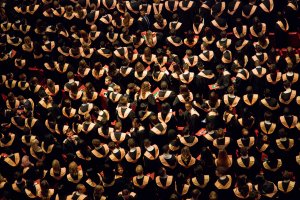Complaint Alleges Unconstitutional Prayer at College Graduation
December 5th, 2018

A complaint was recently filed against Muskegon Community College because it included a religious prayer at its 2018 graduation ceremony.
A complaint was recently filed against Muskegon Community College because it included a religious prayer at its 2018 graduation ceremony.
The complaint was initiated by the Michigan Association of Civil Rights Activists in response to a prayer that was delivered during the 2018 graduation ceremony by a master of ceremonies.
The Content of the Speech Given
The speech in question occurred on May 9, 2018 and was delivered by Reverend Ann Oaks from the Tabernacle Church of God, who has served on the Muskegon Community College Board of Trustees since the mid 1990s. The prayer was delivered to a group of family, friends, and community members. During the prayer, Reverend Oaks prayed to God, acknowledged the “purpose of God,” and asked for wisdom and strength in the name of Jesus.
Response to the Graduation Speech
The Michigan Association of Civil Rights Activists has stated that the prohibition of prayer at public schools as well as college events like graduation ceremonies is a long established area of law. In a letter to Muskegon Community College, two Supreme Court cases were cited: Lemon v. Kurtzman from 1971 and Lee v. Weisman from 1992. Lemon was responsible for the creation of the Lemon Test, which prohibits public institutions from engaging in activities that either advance or inhibit religious practices or lead to excessive government involvement with religion. There are three requirements under the Lemon test – the government’s action must have a secular legislative purpose, the government’s action must not have the effect of either advancing or inhibiting religion, and the government’s action must not result in excessive entanglement by the government with religion. If any these requirements are not met, an action is classified as unconstitutional under the Establishment clause of the First Amendment.
In Lee, the court specifically prohibited either church-led or government-led prayer at either college events or public schools.
Previous Efforts by the Michigan Association of Civil Rights Activists
Previously, the Michigan Association of Civil Rights Activists led a campaign against Pere Marquette Township over a cross monument honoring a Catholic priest of the same name. The Michigan Association of Civil Rights Activists has also filed a number of complaints in recent years promoting the separation between church and state including actions against Fremont schools for Bible release time classes and one against Byron Center schools for its baccalaureate program.
Under the Freedom of Information Act, the Michigan Association of Civil Rights Activists requested a copy of the commencement program as well as all communication between the school’s administration and Reverend Oakes that was related to the the event.
Monitor The Universal Life Church Blog’s
Many of the areas related to the separation between church and state are long established, but despite this, there are still numerous challenges each year to this body of law. Fortunately, by reading the Universal Life Church’s blog, you can remain up to date with the most noteworthy of these developments.


